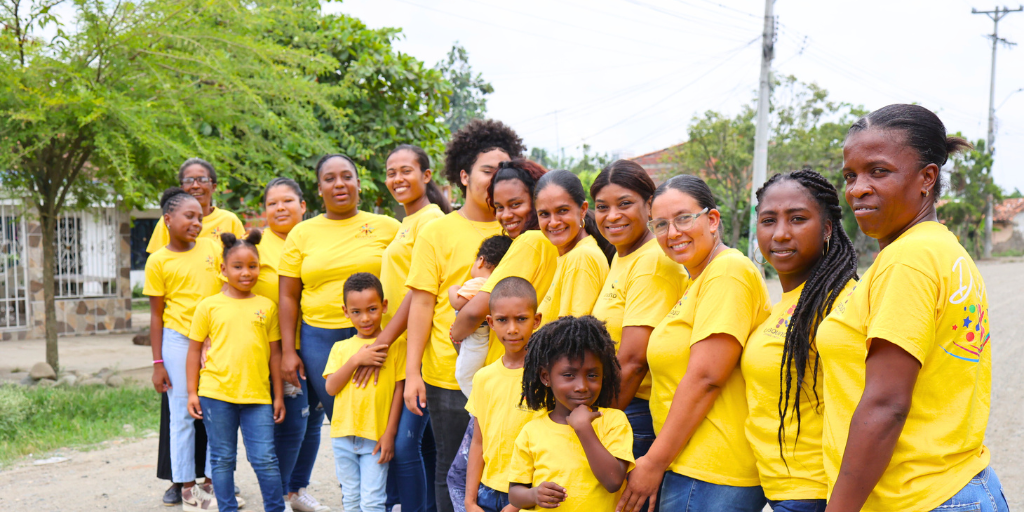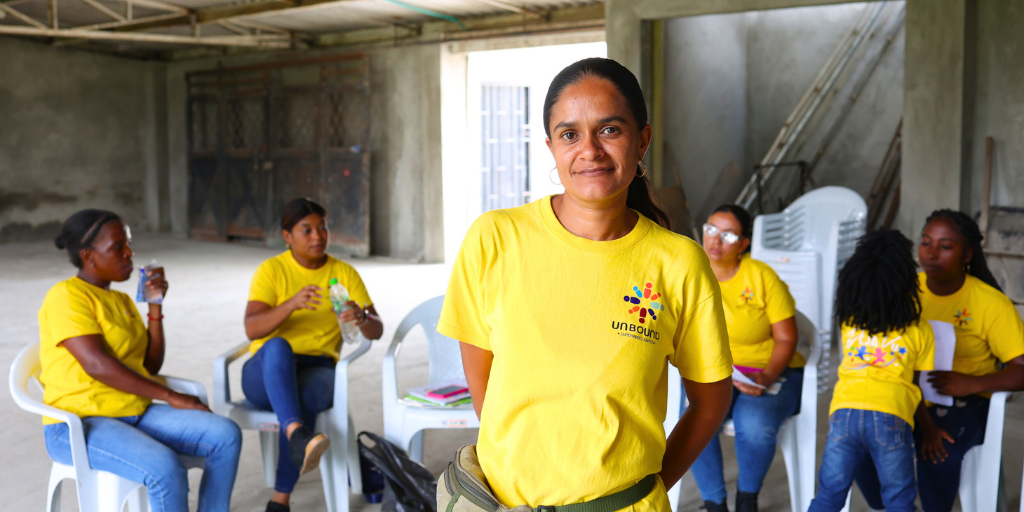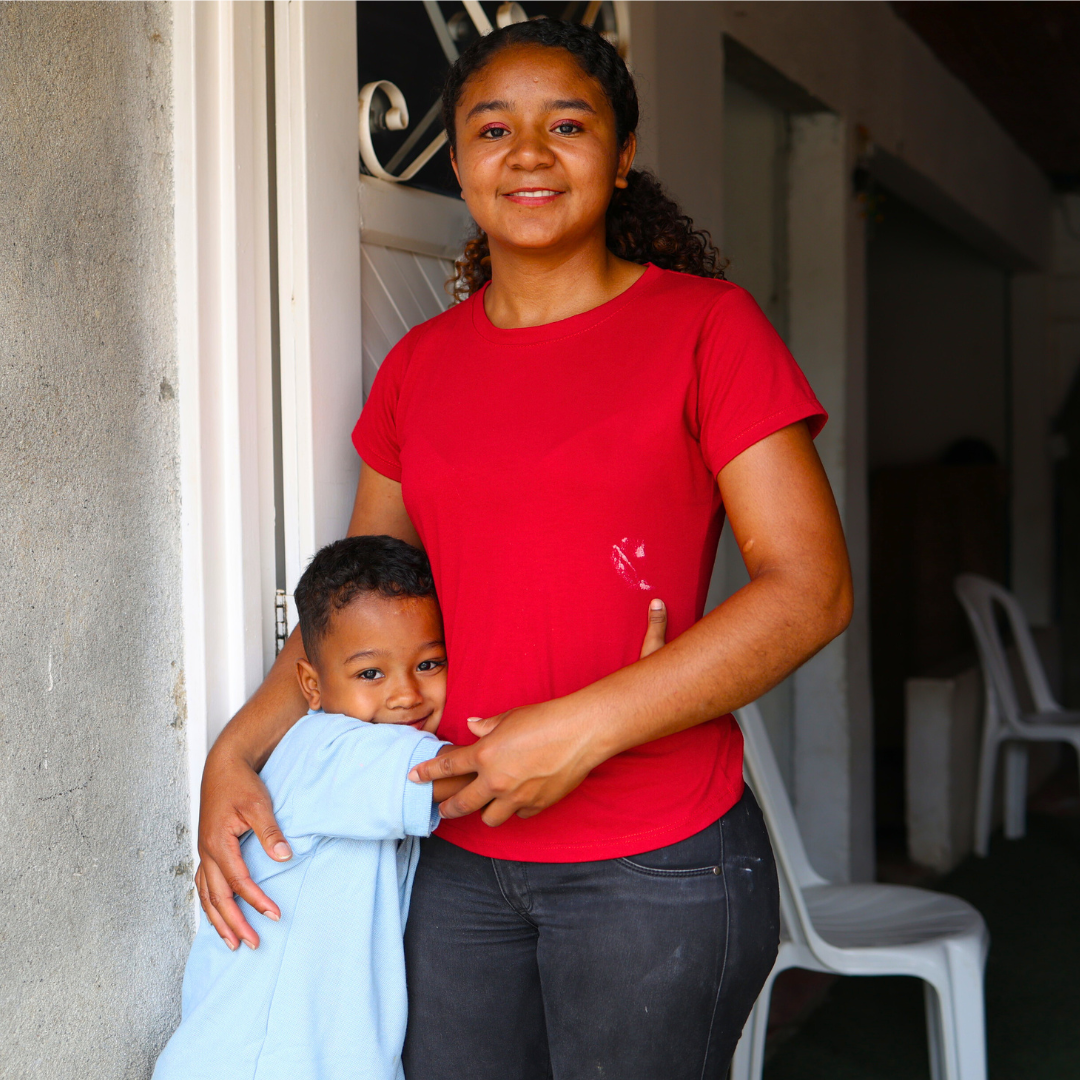
Kati Burns Mallows, senior writer for Unbound, describes how supporting mothers has led to lasting change.
The echoes reverberate across a community hall in a rural village in Cali, Colombia, where 10 women and children of various ages have formed a circle and are dancing, one behind the other, inside a ring of white plastic chairs.
This is their safe space; this is where each one of the women leaves it all—the pressures of their personal lives, anxiety about the future, fear of failure, the feeling of what it’s like to struggle in silence, as a woman and mother.
Some women hold their infants across their bellies, smiling, while other children and participants are laughing, their voices rising higher, with more confidence, as they dance together.
This is their “warmup” before they take their seats for the meeting and the real discussions can begin—about the goals they’re working on that will eventually help them lift their families out of poverty, about how they can support each other, about their next community development project.
But not before the mother leader, Maria, makes a point to go around the circle and greet each member of the Deja Vu mothers group with a hug, a fist bump or a high five.
Maria remembers how, just a year ago when the group formed, most of the women would barely look at or speak to one another. They didn’t want to be there; they didn’t have the confidence to share their struggles.
That was before they knew their own thoughts and dreams had value, not just to each other, but also to the wider world.
Their story is only one of many that attests to the power that lies in bringing together women and mothers who live in poverty to build stronger communities.

Mothers Groups Help Women Move Beyond Poverty
The Unbound Mothers Group model was established more than 20 years ago in India.
Organized and encouraged by local Unbound staffs, mothers groups (self-help and parent support groups) are the primary way that families participate in Unbound. Comprised of 15-30 people, mostly mothers from the same communities whose children are sponsored through Unbound, mothers groups meet monthly to encourage learning and growth in a spirit of collaboration. The groups awaken self-discovery and leadership formation—to promote entrepreneurship and savings strategies and, eventually, to lead community development initiatives.
Today, more than 12,000 mothers groups are active across Africa, Asia and Latin America, the three regions of the world where Unbound has programs. Mothers groups stand as a proven model of success, proof of how activating the mother can effectively help move families beyond poverty.
Since they’ve been in existence, mothers groups have been responsible for the development of more than 30,000 small businesses around the world. They’ve implemented more than 1,500 community development projects and are largely the groups that lead Unbound’s Agents of Change initiatives from start to finish.
The Esperanza de Vida (Hope of Life) mothers group in Cali, Colombia, led by mother leader Leidy, serves as a good example of how the mothers support group model works to break the cycle of isolation often felt by women.
In Cali, mothers groups have been active since 2014. Leidy, who at just 24 years old is one of the youngest ever elected mother leaders, said their mothers group meeting location is “a space that we have for ourselves.” In this space, which they call “the Circle of Dreams,” mothers are free to share their challenges.
“That Circle of Dreams is us mothers, and we listen to each other,” Leidy said. “If they want to cry, they cry. If they want to laugh, they laugh, but it is something that remains in the moment of the Circle of Dreams.”

Investing in Women and Mothers Sparks Lasting Change
Through activities with her mothers group, Maria, the leader of the Deja Vu mothers group, discovered a hidden talent—gardening. She loves to grow vegetables and has begun a garden at her home.
Just as she coaxes plants from the earth now, Maria’s spunkiness and welcoming attitude coaxes uncertain group mothers to let down their walls, to bloom together.
Already, with just a year in as an active group, Deja Vu mothers group has accomplished multiple community development initiatives, including renovating a deteriorating community athletic field and creating an after-school program for children. Future projects for the group include working on improvements to local road infrastructure, making their community more accessible.
Maria dreams of many things, but in one word, her biggest dream is to see growth—not just for her family but for her community. She dreams of seeing her community grow in union with other people.
When she compares her dreams with those of her Deja Vu mothers group and their influence thus far, the same word comes to mind: growth.
Share your thoughts with the Catholic Mom community! You'll find the comment box below the author's bio and list of recommended articles.
Copyright 2024 Kati Burns Mallow for Unbound
Images: copyright 2024 Unbound, all rights reserved.
About the Author

Unbound
Unbound is an international nonprofit founded by lay Catholics grounded in the Gospel call to put the needs of the marginalized and vulnerable first. We build relationships of mutual respect and support that bridge cultural, religious and economic divides. We bring people together to challenge poverty in Africa, Asia, and Latin America. We invite you to join us. Find us on Facebook, Instagram, and YouTube.


.png?width=1806&height=731&name=CatholicMom_hcfm_logo1_pos_871c_2728c%20(002).png)
Comments